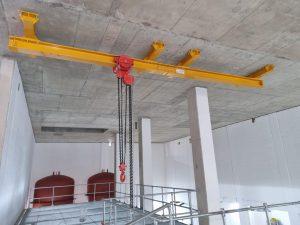Hoist & Winch elevates success of large construction project
Hoist & Winch Ltd has recently completed a challenging project for one of the UK’s biggest construction companies involved in large-scale new home development projects. Faced with a demanding and highly technical brief, Hoist & Winch rose to the task, providing a turnkey lifting system solution to ensure complete success for its client.
The requirement was to install a concrete ceiling mounted 7.5t swl (safe working load) lifting beam and manual chain hoist into the basement energy room of a large new tower block. This development is part of a large-scale prestigious regeneration project providing 5500 sustainable new homes in North London.
At the design stage, following formal tender and contract award, Hoist & Winch set about identifying the optimal solution. Due to restricted access into the basement area, the company decided to utilise a two-piece lifting beam design with an overall length of 7m. To join the two lifting beam sections, Hoist & Winch designed a central splice joint of bolted construction with a reinforced bottom beam flange.
In order to spread the lifting loads over a greater area of the concrete ceiling slab it was decided to mount the lifting beam via four intermediate cross members, each having a four-bolt/anchor fix into the concrete ceiling at both ends. Featuring a robust bolted construction design it was possible to deliver the lifting beam to site in fully dismantled form for ease of transportation and access.

M24 resin anchors with an embedment of 255 mm into the 400 mm deep reinforced concrete slab fixed the intermediate cross members directly to the ceiling for maximum security.
For approval by engineers at the main contractor, Hoist & Winch submitted design drawings and calculations for the structural design of the lifting beam and loading of the resin-type ceiling anchors.
With the design approved, Hoist & Winch could progress to manufacturing, followed by delivery to site. Using building column positions as datum points, the installation line of the lifting beam was marked out while working from scissor lifts and an aluminium scaffold tower located on the upper mezzanine floor. A surveyor’s laser line initially identified the correct lifting beam position, prior to overlaying with red chalk to ensure accuracy for the duration of the installation work.
Raising the two lifting beam sections into position required the installation of eight 1t swl hand chain blocks, with each one suspended from M16 swivel eye bolts supported from flush-mounted anchored resin inserts drilled into the concrete ceiling slab.
Following sample pull load testing, Hoist & Winch raised each lifting beam section into position using four 1t swl hand chain blocks. To raise the lifting beams to the full height and clamp them hard against the concrete ceiling slab ready for drilling, the company used two special lifting rigs per beam section.
The first lifting beam section manoeuvred into position also included the 7.5t swl hand chain block, which was rolled on to the lifting beam at low level using a 1t swl hand chain block temporarily suspended from local steelwork. Once both lifting beams were in position, Hoist & Winch joined the two lifting beam sections using the aforementioned bolted splice plate.
Next, the company undertook ceiling slab drilling operations and resin anchor installation for all 32 ceiling anchor points after very carefully cleaning each hole with a special heavy-duty internal brush and suction pump. Following the specified resin curing time, Hoist & Winch could tighten each anchor bolt to the required torque levels.
The final installation and test operation was LOLER (Lifting Operations and Lifting Equipment Regulations) inspection of the lifting beam and manual chain hoist unit. This activity included dynamic load testing of the entire runway beam length with a 7.5t skid-mounted test load followed by 125% static proof load test in accordance with BS 2853 2011.



